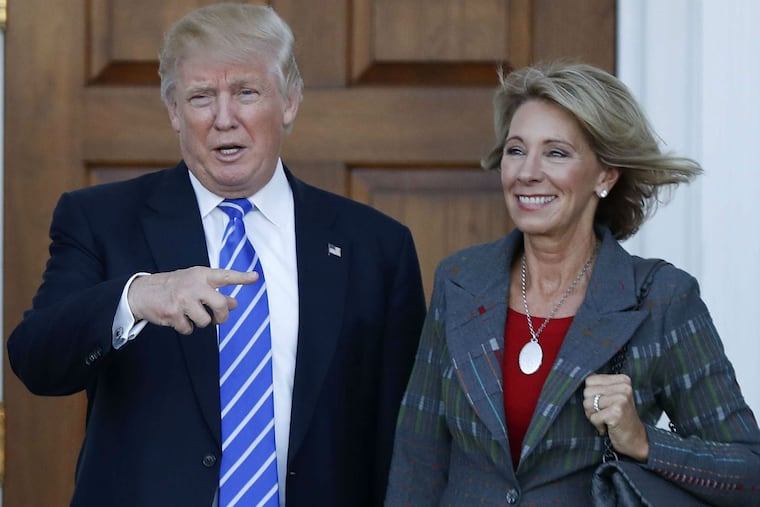Commentary: Get past stale debates on charter schools
You're an enemy of American public schools! You're an enemy of poor American children! Welcome to our national debate - such as it is - over charter schools, which received a shot in the arm last week after President-elect Trump nominated Michigan charter-school activist Betsy DeVos for secretary of education. In predictably lockstep fashio

You're an enemy of American public schools!
You're an enemy of poor American children!
Welcome to our national debate - such as it is - over charter schools, which received a shot in the arm last week after President-elect Trump nominated Michigan charter-school activist Betsy DeVos for secretary of education. In predictably lockstep fashion, DeVos' critics warned that charter schools are harming American public education; meanwhile, her champions said charters improve schooling for America's least privileged kids.
They're both wrong. Nearly three million children now attend about 7,000 charter schools, which have witnessed astonishing successes and awful failures and everything in between. So any blanket generalization about "charter schools" will almost surely be false.
We know that some charter schools like those in the Knowledge is Power Program (KIPP) have helped poor kids make stronger academic gains than their similarly disadvantaged peers in regular public schools. But we also know that other charter schools have been cesspools of corruption and inefficiency, enriching private entrepreneurs and giving students little or nothing in return.
Sadly, many of the charters in DeVos' own state fall into the second category. Drawing on the family wealth of her husband, an heir to the Amway fortune, DeVos helped push through a Michigan law allowing for an explosion of charter schools without establishing a strong mechanism for regulating them.
The result has been a boon for private investors, but not for schoolchildren. Eighty percent of charter schools in Michigan are run by for-profit entities, and most of them perform below the state average. Even more, a federal review last year found that charter schools represented an "unreasonably high" fraction of Michigan's lowest-performing schools.
Meanwhile, DeVos helped defeat a measure that would have created a system for closing charter schools that failed. The irony was almost as rich as Betsy DeVos herself. Charter-school advocates have long insisted that their reform would force underperforming public schools to improve their product or close up shop. When charter schools came under fire for low performance, however, DeVos made sure their doors stayed open.
But it's disingenuous for charter critics to focus solely on failed schools like the ones in Michigan, when they know that other charters have registered enormous successes. That echoes charter-school advocates like DeVos, ironically, who often hype high-performing charters without acknowledging all of the ones that have fallen short.
Then there are the politics of test scores, which also can be embraced or eschewed depending on the politics of the moment. Many charter-school opponents question standardized tests as an overall measure of learning, but happily invoke the tests to demonstrate that certain charters aren't "working" as they should. In an equally inconsistent move, charter-school advocates who advertise test-score gains will sometimes question the validity of the tests when the gains don't go their way.
The real question, of course, is what kind of evidence would sway hard-core believers in either camp. In many cases, I fear, nothing would. If you can't imagine a set of facts that would alter your opinion about a given subject, it's no longer an opinion; it's a dogma.
And dogmas prevent real discussion, especially about the always-difficult matter of race. Although both the NAACP and the Black Lives Matter movement have recently called for moratoriums on the establishment of new charter schools, surveys consistently show that most minority voters want more - not fewer - charter options. So does our first African American president, Barack Obama, whose Race to the Top initiative encouraged states to lift their caps on charter schools.
So please, charter critics, spare me the overheated rhetoric about how charters are a conspiracy to benefit white financiers on the backs of black families. Tell that to Obama and his African American secretary of education, John King, who helped start a successful charter-school network himself. And, most of all, tell that to the thousands of minority parents who put their children on waitlists in the hopes of winning a coveted seat at a charter school.
A wide gulf separates King from Betsy DeVos, who has supported public vouchers (for use in private and parochial schools) as well as charters. So has Trump, who pledged to reserve $20 billion in existing federal education money for vouchers. We don't know whether he'll do that, of course, or what kind of difference it would make for America's poorest kids.
But here's what we do know: Charter schools have made a difference for these kids, in some very good and very bad ways. It's time for the adults in the room to figure out which is which, instead of throwing sticks and stones at each other.
Jonathan Zimmerman, who teaches education and history at the University of Pennsylvania, is the author of "Campus Politics: What Everyone Needs to Know" (Oxford University Press) jlzimm@aol.com